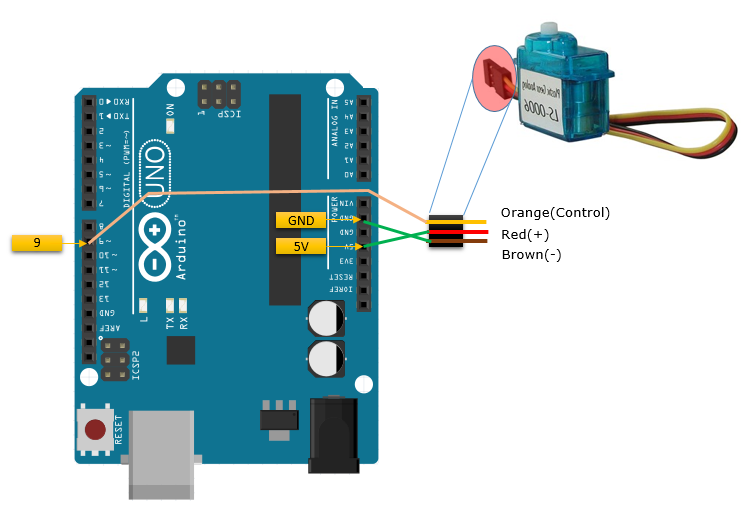
- #Servo motor arduino uno how to
- #Servo motor arduino uno driver
- #Servo motor arduino uno full
- #Servo motor arduino uno zip
#Servo motor arduino uno full
Values so that the servo can sweep though its full range without hitting If your servo is hitting its end stops then you should adjust the * Sweep the servo back and forth from its minimum to maximum position. * Initialise the library and set it to 'servo mode' */ For the HCMODU0097 the default I2C address * I2C slave address for the device/module. Now that the library is installed click on file under the examples tab scroll down until you find hcpca9685 and select the servo example:
#Servo motor arduino uno zip
I tried out the Adafruit library that most people use but found that the HCPA9685 library is much easier to use and just as powerful.Īfter you download it open up your Arduino IDE click on sketch and under the include library tab select add zip library navigate to where you downloaded the library to and select it. Now let’s move on to the sketch the first thing we will need to do is get the library that we will be using. Once you have everything connected it should look something as you can see in the schematic:
#Servo motor arduino uno driver


#Servo motor arduino uno how to
Let’s get started for this tutorial I will be using an Arduino Nano and I will be using two servos but when we get to the Arduino sketch I will show you how to add more. The first thing we need to do is connect our PCA9685 Servo Driver module to our Arduino board. That is, for LEDs you probably want 1.0 KHz but servos need 60 Hz – so you cannot use half for LEDs 1.0 KHz and half 60 Hz. Each PWM runs completely independently but they must all have the same PWM frequency. Each port has 3 pins: V+, GND and the PWM output. Pulled low by default so it’s an optional pin! There are two sets of control input pins on either side. Both sides of the pins are identical! Use whichever side you like, you can also easily chain by connecting up two side-by-sides. When the pin is high the outputs are disabled. When this pin is low all pins are enabled. Can be used to quickly disable all outputs. So it only takes up two of your Arduino pins A4 and A5. You can add multiple PCA9685 modules to control even more servos but for this tutorial we will stick with just one also this module uses I2C communication. The Arduino UNO has only 6 PWM pins that you can use for controlling servos but by adding one of these modules you can control up to 16 servos. I would appreciate your support in this way! PCA9685 Servo Driver: I may make a commission if you buy the components through these links. The only condition is that the main control chip supports I2C communication, which means enabling the communication between the chip and PCA9685 Servo Driver, so as to control multiple servos simultaneously. PCA9685 is a 16-Channel and 12-Bit PWM Servo Driver can help a lot when there are insufficient PWM output pins for the MCU in your project. In this article we will look at how you can control up to 16 servos with your Arduino board using a PCA9685 Servo Driver module. Thanks to the PWM PCA9685 Servo Driver which can control multiple Servos using only two wires, because it uses the I2C bus.

There are times when we need to control more Servos then in a situation like this we will need more pwm pins. PCA9685 Servo Driver with Arduino- We often need to use Servos in our projects, without a servo driver we can control just a few servos because we have less number of pwm pins in Arduino Uno and Arduino Nano.


 0 kommentar(er)
0 kommentar(er)
